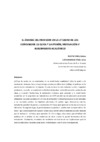Please use this identifier to cite or link to this item:
https://accedacris.ulpgc.es/jspui/handle/10553/77315
| DC Field | Value | Language |
|---|---|---|
| dc.contributor.author | Ruiz Alfonso, Zuleica | en_US |
| dc.contributor.author | León González-Vélez, Jaime José | en_US |
| dc.date.accessioned | 2021-01-25T15:30:07Z | - |
| dc.date.available | 2021-01-25T15:30:07Z | - |
| dc.date.issued | 2017 | en_US |
| dc.identifier.isbn | 978-84-697-4106-1 | en_US |
| dc.identifier.other | Dialnet | - |
| dc.identifier.uri | https://accedacris.ulpgc.es/handle/10553/77315 | - |
| dc.description.abstract | ¿Influye la pasión de los estudiantes en su rendimiento académico? ¿Son la pasión y la motivación intrínseca hacia el aprendizaje constructos diferentes? ¿Influye el profesor en la pasión de los estudiantes? El objetivo de este estudio ha sido contestar a estas preguntas analizando, para ello, la relación entre el énfasis del profesor en la utilidad de los contenidos de clase, y la pasión harmoniosa, la motivación intrínseca para aprender y el rendimiento académico en la asignatura de matemáticas en 1170 estudiantes de educación secundaria obligatoria. Los datos se analizaron a través de un modelo multinivel de ecuaciones estructurales y los resultados avalaron las hipótesis planteadas. En primer lugar, observamos que los estudiantes perciben la pasión y la motivación intrínseca para aprender como dos constructos diferentes. En segundo lugar, la pasión harmoniosa predice el rendimiento en matemáticas. En tercer lugar, esta relación entre pasión harmoniosa y rendimiento en matemáticas está mediada por la motivación intrínseca para aprender. En último lugar, observamos que el énfasis del profesor en la utilidad de los contenidos de clase predice la pasión harmoniosa de los estudiantes. Finalmente, discutimos los resultados en función de sus implicaciones para la práctica educativa y hacemos propuestas metodológicas para futuras investigaciones. | en_US |
| dc.description.abstract | Does students’ harmonious passion influence their academic performance? Are harmonious passion and intrinsic motivation to learn different constructs? Does teacher influence students’ harmonious passion? The aim of this study was to answer these questions by examining the relationship between teachers’ emphasis on class contents usefulness and students’ harmonious passion, intrinsic motivation to learn and math achievement in 1170 high school students. Data were analyzed using a multilevel structural equation model and results showed support for the four hypotheses tested. First, we found that students perceived harmonious passion and intrinsic motivation to learn as different constructs. Second, harmonious passion was positively associated with math achievement. Third, the relationships between harmonious passion and math performance was mediated by intrinsic motivation to learn. Fourth, teachers’ emphasis on class contents usefulness predicted students’ harmonious passion. Finally, we discussed the findings in terms of their implications for educational practice and methodological suggestions for future research. | en_US |
| dc.language | spa | en_US |
| dc.publisher | Asociacion Interuniversitaria de Investigacion Pedagógica (AIDIPE) | en_US |
| dc.source | Actas XVIII Congreso Internacional de Investigación Educativa: interdisciplinariedad y transferencia (AIDIPE, 2017), p. 1977-1984 | en_US |
| dc.subject | 5801 Teoría y métodos educativos | en_US |
| dc.subject | 6104 Psicopedagogía | en_US |
| dc.subject.other | Rendimiento en matemáticas | en_US |
| dc.subject.other | Estilos de enseñanza | en_US |
| dc.subject.other | Motivación del estudiante | en_US |
| dc.subject.other | Mathematics achievement | en_US |
| dc.subject.other | Student Motivation | en_US |
| dc.subject.other | Teaching Styles | en_US |
| dc.title | El énfasis del profesor en la utilidad de los contenidos de clase y la pasión, motivación y rendimiento académico | en_US |
| dc.type | info:eu-repo/semantics/conferenceObject | en_US |
| dc.type | Conference proceedings | en_US |
| dc.relation.conference | XVIII Congreso Internacional de Investigación Educativa (AIDIPE 2017) | en_US |
| dc.identifier.url | http://dialnet.unirioja.es/servlet/articulo?codigo=7715980 | - |
| dc.description.lastpage | 1984 | en_US |
| dc.description.firstpage | 1977 | en_US |
| dc.investigacion | Ciencias Sociales y Jurídicas | en_US |
| dc.type2 | Actas de congresos | en_US |
| dc.contributor.authordialnetid | 3727261 | - |
| dc.contributor.authordialnetid | 3199188 | - |
| dc.identifier.dialnet | 7715980ARTLIB | - |
| dc.utils.revision | Sí | en_US |
| dc.identifier.ulpgc | Sí | en_US |
| dc.contributor.buulpgc | BU-EGB | en_US |
| item.grantfulltext | open | - |
| item.fulltext | Con texto completo | - |
| crisitem.event.eventsstartdate | 28-06-2017 | - |
| crisitem.event.eventsenddate | 30-06-2017 | - |
| crisitem.author.dept | GIR IATEXT: Didáctica, Aprendizaje y Motivación en Contextos Específicos | - |
| crisitem.author.dept | IU de Análisis y Aplicaciones Textuales | - |
| crisitem.author.dept | GIR IATEXT: Didáctica, Aprendizaje y Motivación en Contextos Específicos | - |
| crisitem.author.dept | IU de Análisis y Aplicaciones Textuales | - |
| crisitem.author.dept | Departamento de Educación | - |
| crisitem.author.orcid | 0000-0001-7090-0096 | - |
| crisitem.author.orcid | 0000-0002-9587-4047 | - |
| crisitem.author.parentorg | IU de Análisis y Aplicaciones Textuales | - |
| crisitem.author.parentorg | IU de Análisis y Aplicaciones Textuales | - |
| crisitem.author.fullName | Ruiz Alfonso, Zuleica | - |
| crisitem.author.fullName | León González-Vélez, Jaime José | - |
| Appears in Collections: | Actas de congresos | |
Page view(s) 10
215
checked on Jan 9, 2026
Download(s)
76
checked on Jan 9, 2026
Google ScholarTM
Check
Altmetric
Share
Export metadata
Items in accedaCRIS are protected by copyright, with all rights reserved, unless otherwise indicated.
